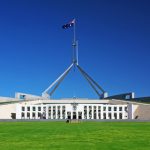“It’s Designed to Fail”: Geoffrey Watson SC on Morrison’s Federal ICAC Proposal

A long time ago in a galaxy far, far away, prime minister Scott Morrison promised he was going to deliver on the long-sought-after federal anti-corruption commission. It would be kind of like a NSW ICAC, although shrouded in secrecy.
The Coalition government then laid the proposal down to rest.
Two years later, Independent MP Helen Haines introduced a bill that delivered on the PM’s dated promise of an integrity watchdog at the federal level. And as if by some conjuring trick, attorney general Christian Porter was suddenly able to produce his proposal just one week later.
Released on 2 November, the exposure draft of the Commonwealth Integrity Commission (CIC) Bill 2020 is a lengthy document, establishing what commentators are calling a toothless watchdog. And it’s guaranteed to remain in draft form for some time yet, as a six month consultation period applies.
The proposed anti-corruption body sets up two divisions: law enforcement and public sector. And the main bone of contention with the statutory body is that public sector hearings – which include those involving politicians – will be held in secret, out of the public eye.
Weeding out the corrupt
One of the most prominent critics of the draft proposal the attorney general has delivered has been esteemed Sydney barrister Geoffrey Watson SC.
On the day after the bill’s release, he said in an opinion piece in the Herald that he initially thought Porter “was just putting forward a bad model”.
And Watson ought to know, as over the last decade he’s served as the counsel assisting the NSW ICAC (Independent Commission Against Corruption) on a number of high-profile cases, which have involved senior politicians, well-known businesspeople, and yes, Labor powerbroker Eddie Obeid.
The product liability, professional negligence and general insurance barrister highly regards the function of the state anti-corruption watchdog that he’s served. And he asserts that there desperately needs to be such a commission – with the same ability to act – at the federal level.
Not only is our government failing the nation by refusing to set up a body to deal with public service corruption, but, according to Watson, it’s also failing the international community, as he argues it’s required under article 36 of the UN Convention against Corruption, of which Australia is a signatory.
The most serious of crimes
Watson has served as counsel assisting a number of commissions and inquiries, including the now replaced NSW Police Integrity Commission. And he explains that while some question the powers a body like the ICAC has, when you’re dealing with public sector corruption, they’re a necessity.
The barrister also warns that as Porter’s proposed CIC won’t have the power to consider historical matters, by the time it ever gets up, a number of questionable episodes will have fallen by the wayside – think, sports rorts or the Great Barrier Reef Foundation.
Sydney Criminal Lawyers spoke to Geoffrey Watson SC about the continuing delays involved in the government’s proposal, the enormous effect that public service corruption has at the global level, and why whistleblowers should not be penalised for coming forward, no matter what the complaint.
Firstly, the Morrison government initially promised to establish its anti-corruption watchdog two years ago. Since then, it’s sat on its hands about it.
Then after Independent Helen Haines introduced her own federal corruption commission legislation, the attorney general released his draft bill. And the government has provided a six month consultation period.
Mr Watson, in your opinion, is the government serious about establishing this commission? And what’s with all these delays?
No, they’re not serious. At the last federal election, the Labor Party came out and supported a strong model for an independent anti-corruption agency. There was a lot of discussion and pressure at the time, and the Coalition made a kind of offer to do the same.
There had been pressure on them to respond. Now, you can look back and say it wasn’t a genuine promise.
As for the rest of the delays, they’re inexplicable. Helen Haines doesn’t have the resources of government. And she was able to produce something in a relatively short period of time.
Legislation like this could be placed on the discussion table in a matter of weeks. Not two years. There’s no proper explanation for why this has taken so long.
Any suggestion that COVID prevented it is laughable. There has been other legislation, which they’ve been able to draft and introduce, things like taking telephones away from refugees in detention.
When you’re talking about a two year delay, you’re talking now about no earlier than 2021 that this thing will come for a vote.
It’s disgraceful. I can’t help but think that after scandal after scandal has emerged, there are those in the Coalition parliamentary room who thought it’s not in their interest to get a powerful investigative body looking over their shoulder. It’s cynical.
As you’ve pointed out, the CIC will be split in two. It will subsume the current federal law enforcement watchdog, the ACLEI, which will continue to hold public hearings.
The other section will cover the public sector: 80 percent of the public service, including politicians. And it will hold closed door hearings.
What’s behind this distinction?
I know of no theoretical basis to divide the activities like this. And I’ve looked at modelling from around the world and around Australia. There’s no precedent for it.
When Mr Porter was asked about it, he said it was because most of the corruption was emerging from areas of policing. I don’t know where he’s getting that from. There’s no data to support that contention.
I might say, it’s not consistent with my instinctive reaction. I’m not saying that law enforcement is clean or perfect. I just don’t perceive that it’s a bigger problem than other branches of government, including the federal bureaucracy and federal politicians.
But, fundamentally, I just have no idea why two human beings are being treated differently. And when you look at it, again, I see that politicians have resolved that they be treated beneficially under the legislation, and it hardly comes as a surprise to me.
Porter proposes the commission could only proceed with a public service investigation if there’s a reasonable suspicion a crime has been committed. You’ve described this as “just silly”.
But the criminal justice system relies on reasonable suspicion, so why’s it problematic for a body like this to operate in that way?
You’ve got to remember there are two things at stake there. He’s saying that before they can initiate an investigation a commissioner has to personally reasonably suspect that a crime has been committed.
First of all, not all corruption is a crime. An investigative body like this should be looking at things far more broadly than just duplicating the efforts of a police department.
It’s true the current policing services do in several areas operate on the basis of the need first to form a reasonable suspicion, but that’s not actually what this body is designed to do.
It’s not a duplicate of the police force. It’s actually an investigative body, which is set up to tackle a very specific and serious crime, i.e. public sector corruption.
The point is this, public sector corruption is an exceptionally unusual kind of offence, insofar as those people involved in it often know the rules much better than the investigators.
In fact, in some cases, they’re drawing up the rules. Experience has shown overseas, and in NSW, that without powerful investigative techniques, it’s very difficult to uncover public sector corruption.
The second thing is, if you’ve got to already reasonably suspect a crime has been committed before you commence an investigation, how do you do that? It’s circular. You need to carry out the investigation to determine whether or not that’s the basis.
For example, it would eliminate one of the inquiries for which I was involved. That involved the Obeid family, which was triggered by an anonymous tipoff. The anonymous tipoff was perfectly accurate.
Now, in police circles, I’ve heard it joked that there’s no such thing as good detective work, there’s only good collection of tipoffs.
And you’ll see every day of the week that crimes are busted. But it’s none of the CSI nonsense of DNA and fingerprints and whatnot. It’s anonymous tipoffs.
You’ve got to be able to act on those things and investigate them. But under Mr Porter’s model, you wouldn’t be allowed to.
Concerns have been raised around section 70 of the bill, as it makes it an offence to come forth with an unwarranted allegation. It would carry a penalty of up to 12 months prison time.
Do you have concerns around an offence such as this acting as a deterrent to whistleblowing?
I sure do. For starters, places like ICAC, the Police Integrity Commission, and the Law Enforcement Conduct Commission, quite often receive wrongheaded, muddleheaded, sometimes just stupid complaints.
Things like, “My neighbour’s been allowed to extend his balcony. Therefore, there’s council corruption.”
The thing is, they’re not to be discouraged because that’s public involvement in a process. Those agencies have no trouble at all winnowing through the complaints and they discard those ones without a proper basis.
But that doesn’t mean they shouldn’t come along. And it doesn’t mean that the public should be threatened with a criminal offence if they do suspect something has gone wrong.
That may have deterred whoever it was who gave us the tipoff about the Obeids.
I worry about that. In this day and age, when you’re fighting corruption, to think that you would impose more severe sanctions on potential whistleblowers than you would upon politicians strikes me like they’ve got this the wrong way around.
And they don’t have that sort of provision in NSW with the ICAC?
If you’re doing something which is obviously vexatious, there are a range of existing criminal and civil remedies, which can be put against you.
If you’re alleging somebody committed a crime and you’re doing it because you’ve got bad motives – you hate them, you’re a racist, whatever – you can be punished for that under the criminal law, and in conjunction with that there’s defamation.
On release of the draft bill, the attorney general stated that the model the Greens have been pushing for is like the “NSW ICAC on steroids”.
You’ve served as counsel assisting the NSW watchdog for many years. Why is the ICAC such an effective body?
ICAC in NSW has been effective when it has had a strong willed and independent head that’s willing to do those things which could be politically unpopular despite the consequences.
It has also got strong coercive powers, which I can understand a lot of people who have got civil libertarian instincts are concerned about.
There are compulsive powers. You can be required to give evidence and you can’t hide behind the privilege against self-incrimination, or to produce documents, you can’t hide behind legal professional privilege.
But to counter the adverse effect of that, if a matter ever goes to a criminal trial, evidence that’s acquired through that compulsive method, which would otherwise be privileged, is not admissible in a criminal trial, you have to prove it again.
The person’s right to avoid self-incrimination or to claim legal professional privilege over documents or evidence is restored.
So, it does take into account the necessary checks and balances between a criminal justice system and an investigative process.
I’ll say this much, when Mr Porter said that he was engaging in some base politicking because the proposal to which he was referring wasn’t from the Greens at all.
It was actually the work of Helen Haines, the independent member for Indi in Victoria. But Porter just attributed it to the Greens. That’s a fairly standard attack by this Coalition.
Ms Haines is a moderate. But instead of dealing with it on its merits, they prefer to label it as though it came from the Greens, because to this Coalition if you’re calling someone a Green, you might as well be calling them a Communist.
There’s another point to be made about it, Ms Haines’ proposal is not more expansive than the NSW ICAC. In fact, it’s more subdued than the NSW ICAC in a couple of respects.
So, it’s wrong to overstate it. It’s wrong but typical.
In your opinion, why does the nation need a federal anti-corruption investigative body?
You can’t underestimate public sector corruption. As an international crime, it is without a doubt the most serious.
The World Economic Forum has estimated that international corruption increases the cost of doing business by 10 percent, which I find a really ironic figure. When people are talking about 5 percent or 10 percent tariffs as upsetting economic markets, corruption is doing that itself.
These are not my figures. I’m not plucking them out of the air. These are published by the leading analysts.
It also costs lives. Something between 40 and 50 percent of all aid we give to Africa is simply stolen. Lives are lost through that. So, there’s an international need to fight public sector corruption.
Incidentally, I’ll just make the point that the international drug trade could not succeed without public sector corruption.
We’ve got an international role. Here in Australia, we do better than most countries. We rate about 14th or 15th in the world in terms of the table with number 1 being the least corrupt and number 110 the most corrupt. So, we’re doing alright.
But the point is we have been sliding down that table, year in, year out, for years. We’re going backwards not forwards.
If you’ve got a federation, you would think that the lynchpin would be to have the national body leading the way. At the moment, we’ve got integrity organisations in each of the states and territories, but not one federally.
What’s missing? Let me give you two examples from recent experience.
In the NSW Ruby Princess inquiry, it was really important that the inquiry get cooperation from the federal government. And Mr Morrison promised that he would, but he didn’t. The federal government didn’t comply.
So, that inquiry couldn’t get down to the bottom of the federal involvement.
In the even more important – critical – Royal Commission Into the Murray-Darling Basin, the commissioner called for federal documents and the presentation of evidence from federal witnesses. But then the federal government declined.
This is one of these problems in a federation, when you’ve got a lack of cooperation at this kind of level.
A federal body, of course, has got no problems whatsoever in requiring production from federal members or requiring federal members or bureaucrats give evidence. That’s what’s missing from our federation scheme.
Also, we’re not pulling our weight as part of the international community. The argument that I favour is that we are in breach currently of treaty arrangements under which we promised to have such a body.
Now reasonable minds might differ about that. But you can check it because I made that statement on a public occasion and the ABC fact checkers – who are fantastic – fact checked it and they said that what I said was at least arguable.
That’s all I ever present it as. I just think we’re letting down the international community.
We’ve seen instances of very serious money laundering in Australia too. Sadly, with our big banks, our Australia-based banks, and also some of our international banks.
So, that’s why we need something. This is a problem big enough and serious enough to warrant getting our federal government involved.
And lastly, it’s been suggested the long consultation period will allow for a beefing up of the proposed model.
But that begs the question as to why federal politicians would come forth with a weak version to begin with, as surely, they’re well aware it lacks the strength of other such watchdogs.
Mr Watson, how do you see this all playing out from here?
I’m a director of a body called the Centre for Public Integrity. We do a lot of good work in this area. You can look us up on our website. There are some pretty eminent people. In fact, I always like to say that everybody except for me is an eminent Australian.
I was doing some work with them just this morning on this. And on closer analysis of the bill, it seems to me there’s something radically wrong with it.
The thing is it seems almost as if it’s set up as though it’s designed to fail. You could not waste money setting this body up.
Let me give you an example about the referral system. For the public sector branch of the commission to make a referral for an investigation, it has got to come from three persons.
It can’t come from me. It can’t come from you. It can’t come from members of the public. It can’t come from lower level bureaucrats.
It can only come from three people. The top one is the minister. The second one is the head of the department. And the third is a politician, on a very limited basis of self-referral.
So, just think about that for a moment. That excludes referrals from anybody but a minister. Let me tell you why.
Do you think for one moment the head of a department would act to make a referral without referring that issue to the relevant minister? I doubt it.
Do you think that a backbencher who’s engaging in a referral wouldn’t refer that issue first to the parliamentary whip, who’ll refer it to a minister? That’s the way it’s going to work. So, in the end, it can only be ministers.
Let me point out. It excludes shadow ministers. So, for example, Mr Dreyfuss, the shadow attorney general, couldn’t initiate an investigation. He would have to take it to Mr Porter.
All I can say is, this thing is designed to fail. They’re not serious about it.
During the consultation process, these flaws will be pointed out, and they’ll say, “Good god, we’ve got to go back to the drawing board.
I’m 60 years old. I wonder whether I’ll see one in my lifetime.







